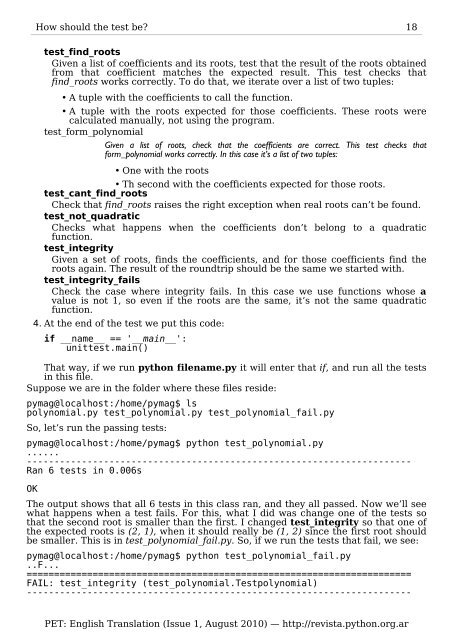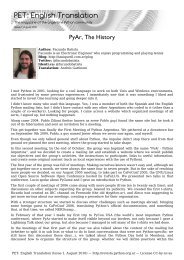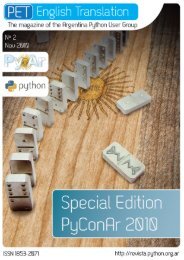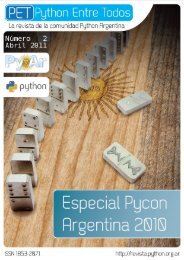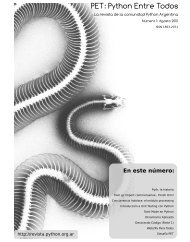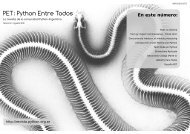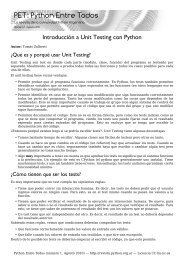A4 portrait - PET: Python Entre Todos - Python Argentina
A4 portrait - PET: Python Entre Todos - Python Argentina
A4 portrait - PET: Python Entre Todos - Python Argentina
Create successful ePaper yourself
Turn your PDF publications into a flip-book with our unique Google optimized e-Paper software.
How should the test be? 18<br />
test_find_roots<br />
Given a list of coefficients and its roots, test that the result of the roots obtained<br />
from that coefficient matches the expected result. This test checks that<br />
find_roots works correctly. To do that, we iterate over a list of two tuples:<br />
• A tuple with the coefficients to call the function.<br />
• A tuple with the roots expected for those coefficients. These roots were<br />
calculated manually, not using the program.<br />
test_form_polynomial<br />
Given a list of roots, check that the coefficients are correct. This test checks that<br />
form_polynomial works correctly. In this case it’s a list of two tuples:<br />
• One with the roots<br />
• Th second with the coefficients expected for those roots.<br />
test_cant_find_roots<br />
Check that find_roots raises the right exception when real roots can’t be found.<br />
test_not_quadratic<br />
Checks what happens when the coefficients don’t belong to a quadratic<br />
function.<br />
test_integrity<br />
Given a set of roots, finds the coefficients, and for those coefficients find the<br />
roots again. The result of the roundtrip should be the same we started with.<br />
test_integrity_fails<br />
Check the case where integrity fails. In this case we use functions whose a<br />
value is not 1, so even if the roots are the same, it’s not the same quadratic<br />
function.<br />
4. At the end of the test we put this code:<br />
if __name__ == '__main__':<br />
unittest.main()<br />
That way, if we run python filename.py it will enter that if, and run all the tests<br />
in this file.<br />
Suppose we are in the folder where these files reside:<br />
pymag@localhost:/home/pymag$ ls<br />
polynomial.py test_polynomial.py test_polynomial_fail.py<br />
So, let’s run the passing tests:<br />
pymag@localhost:/home/pymag$ python test_polynomial.py<br />
......<br />
----------------------------------------------------------------------<br />
Ran 6 tests in 0.006s<br />
OK<br />
The output shows that all 6 tests in this class ran, and they all passed. Now we’ll see<br />
what happens when a test fails. For this, what I did was change one of the tests so<br />
that the second root is smaller than the first. I changed test_integrity so that one of<br />
the expected roots is (2, 1), when it should really be (1, 2) since the first root should<br />
be smaller. This is in test_polynomial_fail.py. So, if we run the tests that fail, we see:<br />
pymag@localhost:/home/pymag$ python test_polynomial_fail.py<br />
..F...<br />
======================================================================<br />
FAIL: test_integrity (test_polynomial.Testpolynomial)<br />
----------------------------------------------------------------------<br />
<strong>PET</strong>: English Translation (Issue 1, August 2010) — http://revista.python.org.ar


